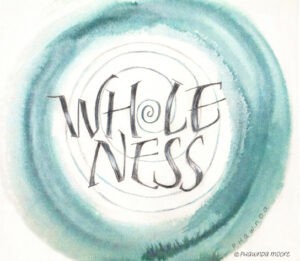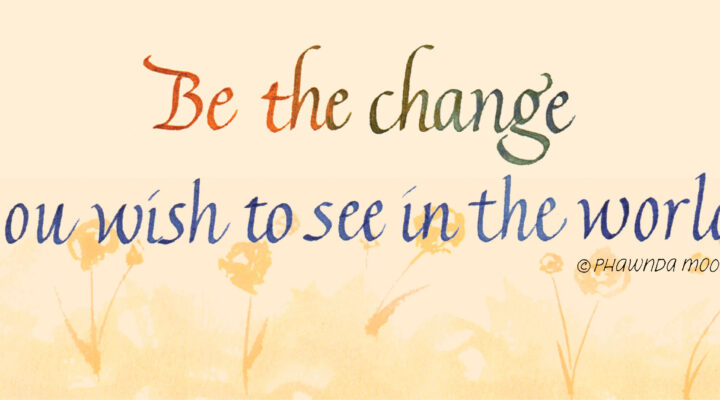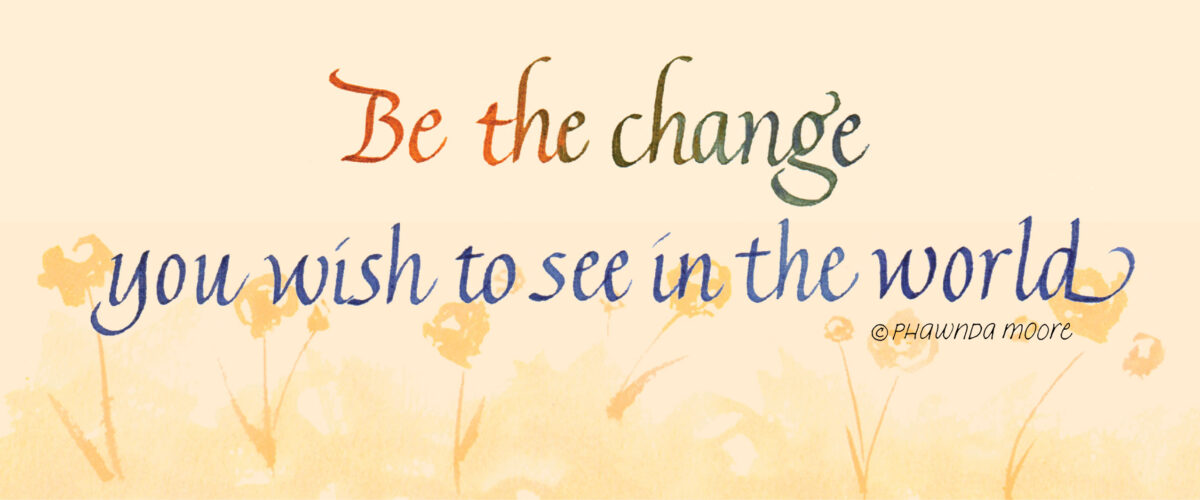The banner quote above (often attributed to Mahatma Ghandi, but most likely it came from others) takes a stand in defining personal power. Words can change us — and others — and ultimately, the world.
Some of my recent articles have invited reflection on words for activism. Whether they’re spoken, sung, heard, silently prayed or written, words matter; they always have and always will.
And bringing in a new year is the time to make life better with resolutions. But since less than 10% of people actually keep that tradition, choosing a “short and sweet” personal word might be more effective. I once made the list of resolutions and found that many could be categorized for simplicity.
 For example, eating healthier foods, an exercising plan, and reducing insomnia all aim for “wholeness.” One year I chose that word and as the months went by, I added more ways to feel wholeness. This magnified that good feeling of accomplishment and encouraged me to stay on the path.
For example, eating healthier foods, an exercising plan, and reducing insomnia all aim for “wholeness.” One year I chose that word and as the months went by, I added more ways to feel wholeness. This magnified that good feeling of accomplishment and encouraged me to stay on the path.
Another time, I chose “focus,” and its sheer generalization was soon defined in everyday examples. I learned to slow down and see things with new eyes and an open spirit. So I personally recommend choosing one or two words.
The process is flexible and will work for you. Say your aim is to be more intentional, peaceful and happier — positive change. What can you do to get there? What are the roadblocks or adjustments to make? What can you try that you haven’t, yet?
On occasion, one’s personal word (a verb or a noun) comes to mind right away. More often, auditioning words dance around for a few days or so: be real, balance, seek light, etc. When you feel its presence, that’s the one.
For ideas, you’re sure to find one from this list of 250 words.
Once you make the selection, write it down and keep it visible: on the fridge, at your computer, by the bathroom mirror, in the car. Embrace your word and own it. I encourage you to make your choice soon so you can enjoy the benefits.
“Once you make the selection, write it down and keep it visible.”
Dictionaries also weigh into the event by choosing a Word of the Year. This typically reflects life in that year, something folks have popularly “googled,” discussed in politics or on social media.
Some examples of this year’s choices are Oxford: vax, Merriam-Webster: vaccine, Cambridge: perseverance.
Collins Dictionary chose an acronym: NFT for non-fungible token: a digital certificate of ownership of a unique asset such as artwork or a collectible.
Sometimes they select new words of their own: the editors at Dictionary.com proclaimed “allyship— a noun born in the mid-1800s — as the word that dominated conversations in 2021 while we experienced racial and political unrest.Allyship is defined as a supportive association with another person or group, usually one marginalized or mistreated (such as Black Lives Matter).
 Adding words to community projects: One thing I love about our church is that it’s huge on supporting local needs. For the holidays, we added cards to blessing bags for the homeless. One side was hopeful, comforting Scripture (Numbers 6:24-26) that was laminated to the backside of children’s art: “You are a child of God … God loves you as you are.” Since this project takes an efficient organization and many hands and feet, everyone involved is blessed by contributing.
Adding words to community projects: One thing I love about our church is that it’s huge on supporting local needs. For the holidays, we added cards to blessing bags for the homeless. One side was hopeful, comforting Scripture (Numbers 6:24-26) that was laminated to the backside of children’s art: “You are a child of God … God loves you as you are.” Since this project takes an efficient organization and many hands and feet, everyone involved is blessed by contributing.
My art group held a bag decorating morning to personalize bags that contained essentials for seniors in the community, another way to be creative with words. Both of these ideas could be used year-round.
As we let go of things in 2022, that includes words, too. So for heaven’s sake, drop banished words — phrases folks are just plain sick of hearing — from your vocabulary. Lake Superior State University’s annual tongue-in-cheek report has been rounding up the most useless, misused or overused English phrases since 1976.
Make a mental note of their list for 2022:
- Wait, what?
- No worries.
- At the end of the day …
- That being said …
- Asking for a friend …
- Circle back
- Deep dive
- New normal
- You’re on mute. (The most spoken words on video conferencing.)
- Supply chain (examples of the production process such as farming, refining, design, manufacturing, packaging and transportation.)
So at the end of the day (oops, edit that) …
OK, here we go: Reflect a bit on the day to select your personal word. In a 2011 interview with the BBC, lexicographer Susie Dent estimated that while an English speaker may know around 40,000 words, they only actively use about 20,000 of them.
We have lots of word choices for positive change in the new year.

Phawnda Moore
Phawnda Moore is a Northern California artist and award-winning author of Lettering from A to Z: 12 Styles & Awesome Projects for a Creative Life. In living a creative life, she shares spiritual insights from traveling, gardening and cooking. Find her on Facebook at Calligraphy & Design by Phawnda and on Instagram at phawnda.moore.
Related articles:
With New Year’s resolutions around the corner, D.C. pastor wants to help readers ‘win the day’
New Year’s resolutions when you can’t count on anything except COVID | Opinion by David Gushee
Thoughts on crossing the threshold to a new year | Opinion by Bob Newell


